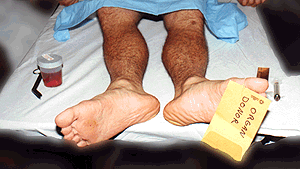Language of the transplant industry

The following is a partial list of the terms used in discussing organ donation and transplantation.
Alternative Execution Donation
A proposal by which death row inmates would opt for organ donation over traditional methods of execution. Following the execution by organ removal, the prisoner’s sentence would be commuted. This commutation might result in benefit to the deceased prisoner’s family.Anencephalic Fetuses [Infants]
The industry argues that organs should be harvested from babies that are born without fully developed brains and who are therefore incapable of long-term survival. Such organs would be deemed suitable for transplantation into other infants.Artificial Organs
Portable and implantable artificial organs are man-made devices that might someday be permanent substitutes for failing hearts, lungs, kidneys, pancreases, and livers.Brain Death Determination
Legal establishment of brain death (as opposed to heart stoppage) involves the loss of cerebral function in most or all of the brain. Many institutions accept brain stem activity (controlling autonomic responses such as heartbeat, respiration, body temperature) as a separate function and declare a patient “brain dead” before brain stem death occurs. This newer definition of death greatly increases the availability of transplantable organs. In 1997, Japan became the last major nation to adopt brain death legislation.Death Benefits
Under one theory, the families of cadaveric donors would receive estate tax deductions or funeral expense reimbursements, the latter coming possibly from the organ recipient(s). To improve the state’s very low donation rate, Hawaii recently suggested that state government pay the families of organ donors. Pennsylvania has offered a proposal that donor families be given $3000 from a special fund to defray funeral expenses.Directed Donation
Many states allow donors to specify the individual(s) who will receive their organs. This results in donations, such as kidney or bone marrow donations, that might not otherwise occur. One variant of this policy would allow donors to specify or exclude certain classes of recipients, such as convicted felons.Free Market
Cadaveric organs would be sold like other commodities, with proceeds going to the family of the deceased. To prevent abuse, the deceased would have had to have included such provisions in his will. It should be noted that the poor are more likely to die under circumstances (homicide or accident at a young age) that favor organ harvesting. They are the least likely to have a will in place at time of death.High-Risk Donors
Organs from those who are likely to have been exposed to incurable diseases, such as AIDS, are usually declined. These organs are said to represent the only hope for some terminally ill patients who advocate that they be made available if a recipient is willing to accept the risk.Mandated Choice
This system would require each individual to decide (upon renewing a driver’s license, for example) whether or not to become an organ donor. Organ retrieval would be mandated even in the face of family objections. The U.S. has this plan in place, but it is rare that medical personnel will seek to over-ride family objections. Under a stricter plan, medical personnel would be liable for allowing family sentiments to interfere with procuring the donor organs.Organ Donor Cards
The Uniform Anatomical Gift Act of 1968 established the legality of organ donor cards. However, most hospitals do not consider a signed and witnessed organ donor card sufficient grounds to remove organs. Hospital personnel, for reasons of legal liability and sensitivity to those suffering a death in the family, will usually seek permission from the next of kin before proceeding.Organ Trading
More than 25% of all transplanted kidneys come from living donors. However, few of these are from “unrelated” donors, such as spouses or friends, due to antigen or blood type mismatches. Live donation rates could be increased by allowing an unrelated person to donate a mismatched kidney to a “pool” in exchange for a matching kidney.Paid Donation
Living organ providers are directly paid for one of their kidneys, bone marrow, etc. This was legal and commonly practiced in India until 1995; the donor received cash and free health care following the operation. For many Indians, it was the only possible way to escape grinding poverty but after-care benefits were not always adequate.Preemptive Preservation
Some U.S. hospitals infuse patients with organ-preserving drugs or ice-cold liquids while attempting to obtain family consent for organ removal. When ice-cold liquids are used, doctors must make deep incisions in the patient’s abdomen and groin. These controversial practices are legal in Florida, Virginia and the District of Columbia.Preferred Status
Those who agree to become organ donors would have preferential access to organs if the need were to arise.Presumed Consent
In the absence of a signed statement to the contrary, this policy would assume that each person has consented to having his or her organs removed following death. A national database would be set up to list those persons objecting to having their organs taken for transplant or research purposes at death.Prospective Sale
Individuals would sign a contract ensuring payments to designated persons upon harvesting of the organs. Payment amounts would be based on the type and number of organs harvested or used. The beneficiary could also be a charity or any nonprofit organization.Required Request
Hospitals are required by federal law to ask the families of potential donors to donate organs. The same law mandates that hospitals have a cooperative relationship with organ and tissue banks, and that designated hospital personnel be given instructions to become “trained requesters.”Whole Brain Death
The irreversible cessation of all brain function, including autonomic functions associated with the brain stem. From a Biblical perspective, this is the only type of “brain death” determination which is sufficient for pronouncement of an individual’s death.Xenotransplantation
This is the use of organs or tissues from other animal species, such as baboons. Xenotransplants have thus far been unsuccessful, but research in this area continues.Whose body is it anyway?
Language of the transplant industry
Attitudes about donation
The age of "Already Dead"
The Wholesalers

